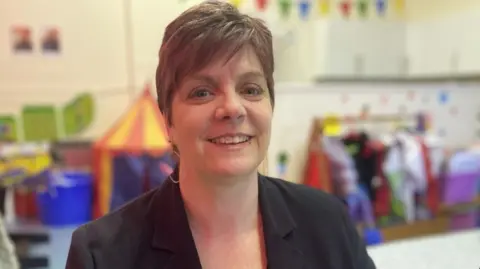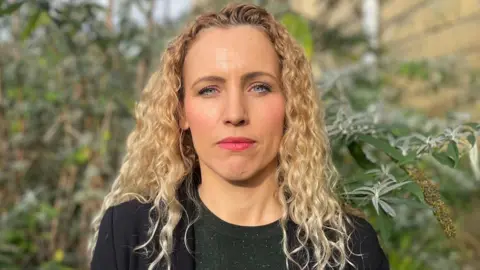'I'm fleeing domestic abuse - it cost me thousands because I have a job'
 Getty Images
Getty Images"It shouldn't cost people to flee domestic abuse," says Gemma, who has moved house three times in an attempt to escape an abusive relationship.
However, she says she was refused access to support - including an affordable stay in a refuge - because she was employed and so was not eligible for help.
"I feel like I've spent thousands and thousands on houses that have been taken from me," she says.
Gemma moved with her children to properties across West Yorkshire in an attempt to escape the man who had been stalking her for the past 25 years.
She says she tried to turn each empty house into a home, but getting financial help for new furniture or redecorating costs was impossible.
"Because I was working, no charity could help. But when you walk into a house that's derelict, your mental health drops straight away," she says.
Gemma has had to take on extra work to afford her rent – which is double the amount she paid in her previous house – and repayments for beds and carpets.
But despite calculating that she would receive roughly the same income if she stopped working and claimed Universal Credit, Gemma says she needs to work for her mental health.
She says it gives her a sense of pride and a work ethic she is proud to have passed on to her children: "It keeps me going."
'Life-saving support'
Few people can afford to pay for emergency accommodation out of their own pocket, according to Nik Peasgood, chief executive of domestic violence support charity Leeds Women's Aid.
Of the 42 places in the charity's refuge, only two people are currently paying towards the cost of their stay.
Ms Peasgood says the housing crisis means people are also staying in the accommodation for up to three years.
It is "unfair" that people who are in work are effectively excluded from this life-saving support, she says.
"It isn't just a roof over your head, it's trained support workers who can do therapeutic work with children, help with rehousing - it's planning a new life."

When Gemma's abuser last tracked her down, she says police warned her that he would kill her if she did not move house.
But, despite the council being warned by police and the doctor treating Gemma about the threat posed by her former partner, she waited eight months to be rehoused as she could not afford emergency refuge accommodation.
Gemma says she had to push for her case to be prioritised and for housing officers to ignore her rent debts, which had built up as a result of overlapping rentals when she had moved previously.
Leeds City Council does not make people ineligible for housing because of rent debts when they are fleeing domestic abuse, but Gemma did not know this.
She was also unaware that there were community services that could have helped her to access safe accommodation with her children when she was in crisis.
"The services were expecting someone to navigate a complex situation when they were in danger," Ms Peasgood says.
"There wasn't anyone to help communication between her and housing."
All professionals have a duty to tell people what support is available to them, Ms Peasgood says.

In many cases, survivors of domestic abuse who are in employment may not have access to their income because perpetrators may take control of their finances.
"Often, women say to us that they don't see their salary," Ms Peasgood says.
But there is no flexibility around someone's circumstances when a charity fills out housing benefit assessments for survivors.
Even if someone has given up their job to flee an abusive relationship, they may not be eligible for some benefits if they are judged to have given up their job voluntarily, she says.
Department for Work and Pensions guidance says if domestic violence is given as a reason for leaving employment, a sanction should not be applied when a person is seeking benefits.
But applicants would need to meet other conditions of entitlement to qualify.
Ms Peasgood argues that anyone who needs to go into a refuge should be able to, regardless of employment status.
Gemma would like to see survivors rehoused quicker, with the help of a designated organisation that acts as a go-between with police and local authority housing services.
Also, she says, those who are working should be eligible to receive a food and care package when they flee, as employed people cannot access foodbanks.
She would also like to see a service that brings people's belongings to their new home, or storage facilities so they can safely keep their possessions.
While Leeds City Council can sometimes offer people storage when being rehoused, this is partly decided on a person's income.
- If you have been affected by the issues raised in this story, you can visit the BBC Action Line for support.
A spokesperson for Leeds City Council says they want anyone who experiences domestic abuse "to be able to quickly and safely access support whenever they need it".
"Our housing service will always endeavour to take individual circumstances into account in prioritising applications for council housing and award a high priority for alternative accommodation for victims of domestic violence or abuse if needed," they say.
"They can also make changes to existing to homes to make tenants safer if required."

Katie White, MP for Leeds North West and an ambassador for Leeds Women's Aid, says there is "a lot of scope" for government to improve services around domestic abuse.
"It is sadly so pervasive across society, so we're going to need a society-wide approach to tackle it," she says.
A fund was created under the previous government to enable charities to apply for money on behalf of people who needed financial support to flee domestic abuse.
But the initiative was due to end in March and it is not known if the government plans to extend it.
Meanwhile, Gemma is still trying to rebuild her life.
However, she is working extra hours to afford her rent and says she was recently knocked off the waiting list for NHS mental health support after missing a call from her GP.
She recently went back to university, but says staff have not been able to put in the measures that would make her feel safe.
"I've not been able to live a normal, carefree life, where I can have my friends round to my house, since I was young," she says.
"You lose everything. You feel constantly punished."
Listen to highlights from West Yorkshire on BBC Sounds, catch up with the latest episode of Look North.
